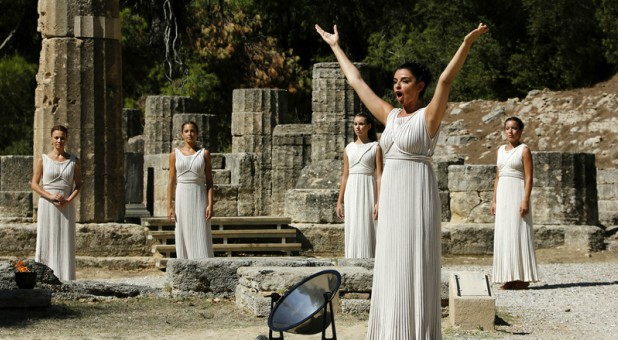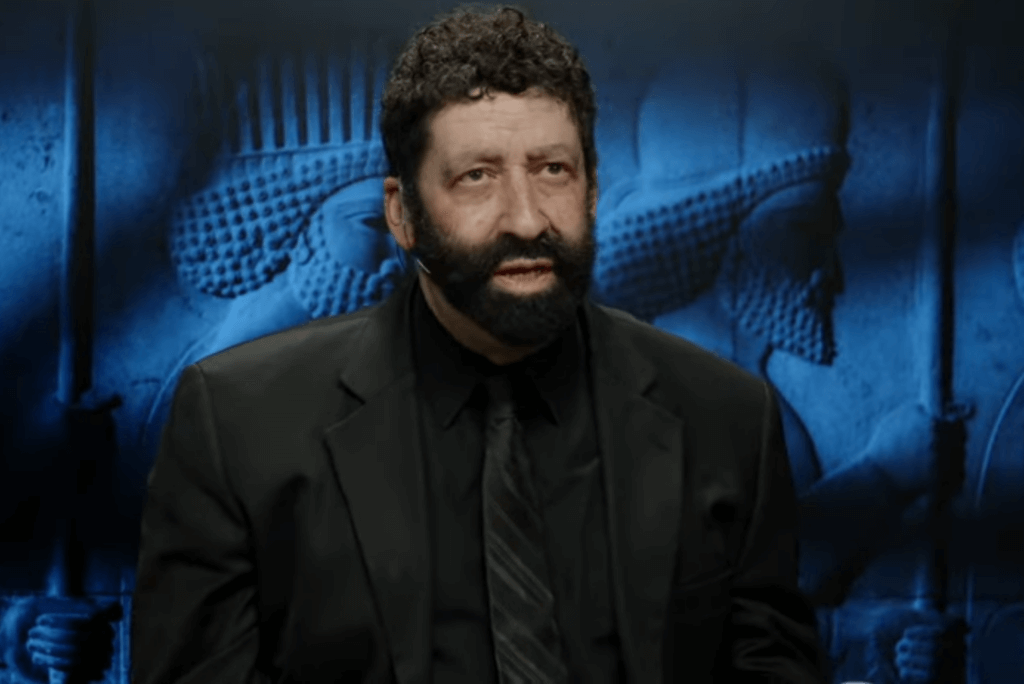Editor’s note: A version of this story ran August 2016 in advance of the Summer Olympics held in Rio de Janeiro.
The 2018 Winter Olympic Games, the 17-day athletic love-fest kicking off to the beat of the Korean janggu drum in Pyeongchang on Friday (Feb. 9), are a secular endeavor featuring more fanfare than faith, more spectacle than spirit.
But it was not always so.
The Olympics — both the long-gone ancient version and the modern version unspooling this month—have deep religious and spiritual roots, which, some scholars say, are in jeopardy as every host city tries to go bigger, better and more memorable than the last.
“The Olympic Games is the international sports event because of the diversity of the sports, the number of faiths represented, the number of countries participating,” said Anthony Moretti, an associate professor of communication at Robert Morris University who has written about the Olympic Games as a form of civic religion.
“But there is nothing spiritual about Coca-Cola, there is nothing spiritual about Dow” or other sponsors of the modern Olympics, which Moretti and others have criticized for straying far from the spiritual intentions of the founders of the International Olympic Committee, the overseer of the games.
“So I think the IOC has some questions to ask,” Moretti continued. “Are we being true to our roots or are we abandoning our past?”
Roots of the Past
The original Olympics began in the fifth century B.C. and were, of course, Greek. And like most things the ancient Greeks did, they were connected to their worship of the gods.
“For the ancient Greeks, the sport of the Olympic Games was quite literally a religious exercise — a display of religious devotion and worship,” scholar Paul Cartledge writes in History Today. Athletes paraded into the stadium past a line of religious officials and often dedicated their performances to a patron god. Even the prizes were religious — crowns of olive leaves made from trees in a sacred grove dedicated to Zeus.
And the winners, Cartledge continued, were revered in a religious way, as “having been touched by divinity, as being raised above the station of a mere mortal.” When they were crowned, a procession headed to the temple of Zeus, where so many animals were sacrificed their ashes, blood and fat formed the altar.
The ancient Olympics carried on until the fourth century A.D. Even its disappearance had religious roots. In 393, the Emperor Theodosius I, a Christian, canceled the games when he banned all pagan rituals.
Religious reboot
For 1,500 years, there were no Olympic Games — until another Christian rebooted them, complete with religious underpinnings.
Pierre de Coubertin, a French aristocrat educated by Jesuits, was raised in 19th-century France, which was torn by war. He admired the ancient Greeks for the way they held a peace every four years to stage the Olympiad. In 1889, as a means of promoting peace between nations and remaking French athleticism, de Coubertin got the idea to revive the games.
On a trip to England, he encountered the work of Thomas Arnold, a Church of England deacon and a promoter of “muscular Christianity” — the idea that the pairing of physical strength with religious piety creates well-rounded, moral and ethical men.
Moretti writes that de Coubertin believed the Olympic athlete “would embody a personal kind of sacred temple … he would be his own representation of the sacred body of followers.”
That belief undergirds the International Olympic Committee, which de Coubertin founded in 1894. The first modern international games were held two years later, in Athens, and included many of the religious trappings of the ancient games, including olive-leaf crowns and sacred fire in the form of the Olympic flame.
A civic religion
Today’s games are almost as religious in nature as the ancient games, though it is a different kind of religion — the rites and core beliefs that bonded the warring Greeks are still there, but they’ve become more secularized than religious, more civic religion than specifically religious.
That civic religion is primarily on display in the opening ceremonies and their rituals audiences have come to expect — the ceremonial raising of the Olympic flag, the playing of the Olympic anthem (originally titled “The Olympic Hymn”) and the reverential lighting of the Olympic torch.
There’s even a quasi-religious vow the athletes and coaches make during the opening ceremonies — an “Olympic Oath” to respect and abide by the rules, to play fair and not cheat.
The athletes who play by those rules and win, Moretti said, are “revered almost as divine” — think Jesse Owens, Mark Spitz, Mary Lou Retton. And those who break those rules suffer a more spiritual than legal punishment.
“It’s an excommunication,” Moretti said, speaking of Ben Johnson, the Canadian sprinter who nabbed three Olympic medals, including a gold in 1988, that were later stripped when it was discovered he used banned performance-enhancing drugs.
“The IOC has said to Ben Johnson: ‘We will never have you in our house again. You have not upheld the faith, the rituals, the standards of the Olympics. There’s the door.'”
Johnson, now 54, never recovered the gloss his Olympic medals lent him — and has never accepted responsibility for his actions.
And when the Olympics are over, the site on which they were held — the stadiums and arenas, the pools and the velodrome — become something of a sacred site. Some people make pilgrimages of a sort to see where the glory happened.
But all of that is endangered by the increasing commercialism of the games — and the growing nationalism some critics see in the lavish promotion of some of their wealthier participating nations. Others trace the collapse of the Olympic ideal to the 1936 Olympics awarded to Hitler’s Berlin, in which some Jewish athletes were prevented from playing.
“The origins of sport are very different from politics or entertainment,” British sports journalist Mihir Bose wrote just before the London Olympics in 2012. “It is about the ‘spirit’ of the game, about helping and improving people. I think those origins have been devalued, it is losing its soul. Events such as the Olympics are a commercial enterprise.”
For Moretti, it boils down to the past.
“If you abandon the past — and some would say the IOC already has — if the leaders of the IOC say ‘we are no longer a spiritual organization, we might just be a win-at-all-costs entity,’ that would kind of bother me,” he said. “But as long as young men and women say, ‘I am striving to be an Olympian and we continue to respect it and watch it and pay attention to it, it still has value.” {eoa}
© 2018 Religion News Service. All rights reserved.
See an error in this article?
To contact us or to submit an article






















